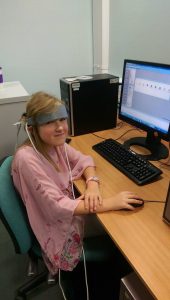
Prenatal alcohol exposure (PAE) is the direct cause of FASD leading to a wide range of physical and mental difficulties that can impact daily living, school, work, social relationships, and long-term health and wellbeing.
Many individuals with this condition also have histories of traumatic experiences such as abuse or neglect in early childhood, which are also known to lead to developmental difficulties similar to those presented in FASD.
At Salford, we conducted research on the combined effects of PAE and childhood trauma in two phases. This project was offered as a funded PhD in partnership with the National FASD clinic in Surrey.
1. A systematic review
We conducted a systematic review that revealed that very little research had been published on the combined effects of PAE and trauma. Only five studies had investigated the impact of both exposures, although one further study was published more recently.
Previous research suggested that children with both PAE and trauma were functionally similar to children with just PAE but tended to have more difficulties than children with just trauma. These studies largely focused on speech, language and communication, but missed out other crucial areas of functioning such as intelligence and perception.
2. Neuropsychological analysis

In the second phase, we assessed the damage caused by dual exposure to PAE and trauma on brain functioning, intelligence, working memory (the ability to hold and manipulate information in the short-term), inhibitory control (the ability to stop oneself from performing an action that feels natural), empathy (an understanding of the perspective and emotional state of other people) and behavioural difficulties.
We used a combination of tests to measure child development (age 8 – 14); brain-imaging technology, fNIRS (functional near infra-red spectroscopy), to look at brain activity along with a series of cognitive tasks assessed verbal, non-verbal and overall intelligence, working memory and inhibitory
We also conducted interviews with parents and caregivers, to explore their experiences of raising a child or children with FASD.
The key findings from this study supported the findings of the literature review. Children with both PAE and trauma appear to function similarly – in terms of brain activity, intelligence, empathy, inhibitory control, and working memory – to children with just PAE and tend to have more severe difficulties than children with just trauma. Therefore, the difficulties seen in children with both these exposures seem to be primarily caused by PAE rather than childhood trauma.
Why is this research important?
- For correct diagnosis and intervention. Children with FASD are at increased risk of a range of traumatic childhood experiences, such as neglect or abuse. Studies into the long-term effects of neglect or abuse show a similar range of cognitive dysfunction and behavioural difficulties as those seen in FASD, but there was a lack of evidence on the impact of a dual exposure of prenatal alcohol exposure and trauma. This is necessary for clinicians, who may need to use the presence of trauma to inform and potentially exclude a diagnosis on the foetal alcohol spectrum. Clinicians and other professionals should be aware that a history of neglect or abuse does not appear to be a better explanation for cognitive dysfunction or behavioural difficulties than prenatal alcohol exposure. Our study suggests that where children have a history of both exposures, they should primarily be treated as children with FASD. provided appropriate support and interventions specifically designed for FASD.
- For appropriate level of support for all. In our study, families described some level of stress caused by dealing with service providers. Doctors and other healthcare workers often did not understand and were unable or reluctant to diagnose FASD. Adoption agencies and social workers were accused of playing down the impact of PAE in order to secure a placement, then leaving families to deal with FASD with no specific support or training. Moreover, parents and children were previously offered services designed for trauma and attachment issues, even when children had no history of trauma. With the proposed DSM criteria, it is hoped that clinician will be able to provide appropriate and early intervention and thus the support and training for parents, carers and teachers will also be correctly adjusted.
| Publications Mukherjee, RAS, Cook, PA , Norgate, SH and Price, AD 2019, ‘Neurodevelopmental outcomes in individuals with fetal alcohol spectrum disorder (FASD) with and without exposure to neglect : clinical cohort data from a national FASD diagnostic clinic’ , Alcohol, 76 , pp. 23-28. Price, AD , Cook, PA , Norgate, SH and Mukherjee, RAS 2017, ‘Prenatal alcohol exposure and traumatic childhood experiences : a systematic review’ , Neuroscience & Biobehavioral Reviews, 80 , pp. 89-98. Price, AD 2019, The impact of traumatic childhood experiences on cognitive and behavioural functioning in children with foetal alcohol spectrum disorders, PhD thesis, University of Salford. |
